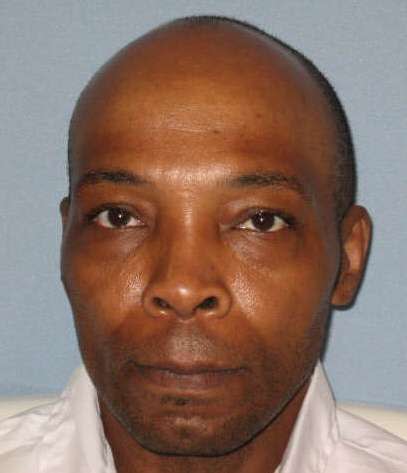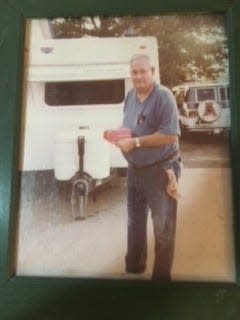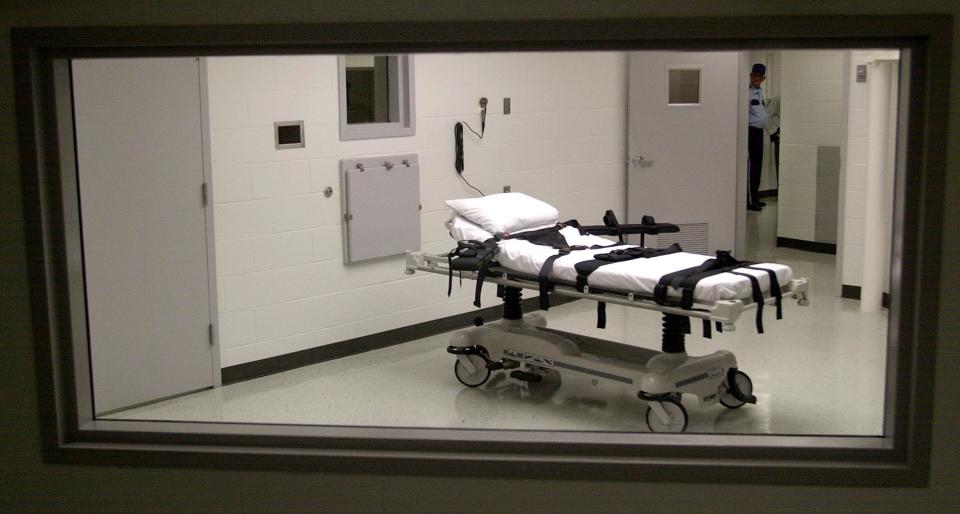Alabama to execute Chicago man in shooting death of father of 7; inmate says he's innocent
A death row inmate set for execution in Alabama on Thursday maintains his innocence in the 1998 shooting death of a 68-year-old courier van driver described as a beloved father of seven.
Keith Edmund Gavin, 64, will become the third inmate executed in Alabama this year and the 10th in the nation if his lethal injection proceeds as scheduled.
The execution will come just two days after the U.S. Supreme Court halted the Texas execution of Ruben Gutierrez in the 1998 murder of an 85-year-old retired schoolteacher. The high court ruled that a lower court must look at Gutierrez's arguments for DNA testing before his execution can be scheduled, if at all.
Gavin was convicted in the murder of William Clinton Clayton Jr. during a botched robbery outside of a bank in the northeastern Alabama city of Centre, about 85 miles northeast of Birmingham.
As Gavin's execution approaches, USA TODAY is looking back at the crime, who Gavin is and what led him down a path that ended in Clayton's death.

William Clinton Clayton Jr.'s murder
William Clinton Clayton Jr., affectionately known as Bill, was a married father of seven children. His youngest son, Matt Clayton, told USA TODAY this week that his father was a great dad, a "gentle giant" and a hard worker who spent 14 hours a day on the job to provide for his family.
On March 6, 1998, Clayton was gearing up to take his wife of 38 years out to dinner. He was driving in his Corporate Express Delivery Systems van when he stopped at Regions Bank in downtown Centre to grab some money from the ATM for the couple's date night.
Meanwhile Gavin had driven to the region from his hometown of Chicago with his cousin, Dewayne Meeks, to track down a woman Gavin had met in the past. Gavin and Meeks arrived in downtown Centre just as Clayton went to the ATM, according to court documents obtained by USA TODAY.
While the men were stopped at an intersection near Regions bank, Meeks testified in court that Gavin got out of the car, walked up to the driver's side of Clayton's van and fired two shots. Meeks then drove off in his car, while Gavin got in Clayton's van − with Clayton still in it and bleeding out − and followed Meeks, court records say.
Danny Smith, an investigator with the local district attorney’s office, testified that he was in the area when he heard about a shooting over the radio, and that both the shooter and victim were in a white van. Soon after that, Smith spotted the van speeding and driving erratically.
A pursuit ensued for several minutes before the van abruptly stopped and the driver jumped out and fired a shot at Smith before running into nearby woods, Smith testified. Smith immediately went to the van to check on Clayton, who was "barely alive" and died shortly after at a hospital, court records say.

Cousin turns into key witness
Within minutes of the van chase, other law enforcement arrived and a search for Gavin ensued. They found him soon after, and though he tried to flee, "he stopped when an officer fired a warning shot," court documents say, adding that Gavin told the officers: "I hadn't shot anybody and I don't have a gun."
The gun, a 40-caliber Glock pistol, was found in the area about a week later and ballistics tests confirmed that it had been used to kill Clayton, court records say.
Meeks, who had driven back to Chicago, was arrested on a murder charge weeks later following interviews with Alabama investigators in Chicago.
The charges against Meeks were later dropped and he was one of the prosecution's key witnesses during Gavin's subsequent trial. Two other witnesses positively identified Gavin as the shooter, court records say.
Keith Edmund Gavin maintains innocence
Gavin has appealed his conviction, arguing that his cousin was the "true perpetrator" and only testified against him after after prosecutors agreed to drop his indictment. Meeks was not convicted in the crime and USA TODAY was reaching out to him for comment.
Gavin, who was previously convicted of murder in 1982 and served 17 years of a 34-year sentence, also argued that his attorneys were ineffective during his trial for Clayton's murder and that the prosecution had a lack of forensic or DNA evidence against him.
In 2020, a federal court in Alabama found that Gavin’s lawyers were ineffective in violation of his right to counsel and maintained that the constitution required a new sentencing trial. That decision was later reversed on appeal.
Evidence of "significant juror misconduct" was also found after Gavin's conviction, also violating his "right to a fair and impartial trial," according to the appellate court records.

More about Keith Edmund Gavin
Gavin was one of 12 siblings and came from a line of "multi-generational family dysfunction," federal court documents say. His parents both came from "highly dysfunctional families with histories of drug use, alcoholism, and incarceration," the documents say.
Gavin's father, who was physically abused as a child, later abused him, his siblings and their mother, the records say. He and his siblings would often be beaten with extension cords, sticks, hoses and his father's fist until they "drew blood," the documents say.
Most of Gavin's siblings were into drugs, gangs or other criminal activity while living in overcrowded homes in Chicago, according to the documents. At a young age, Gavin also witnessed some family members' involvement in prostitution.
At 17, Gavin was hospitalized by a group of gang members who beat him with baseball bats and guns, the documents say.
When Gavin was released from Illinois prison in 1997, he was "unemployed, depressed and his family was destitute," according to the records.
Alabama will forgo Keith Edmund Gavin's autopsy
Last month, Gavin's attorneys filed a lawsuit requesting that his client's body not undergo an autopsy after the execution, saying that he's a "devout Muslim."
“His religion teaches that the human body is a sacred temple, which must be kept whole," the lawsuit says. "Mr. Gavin sincerely believes that an autopsy would desecrate his body and violate the sanctity of keeping his human body intact."
Alabama agreed to forgo the autopsy, the Montgomery Advertiser reported.
Contributing: Marty Roney.
This article originally appeared on USA TODAY: Keith Edmund Gavin to be executed in Alabama in murder of father of 7

